Links are the currency of the world wide web – sites that have authoritative links are rewarded with higher ranking positions in the SERPs, while those that don’t are practically invisible to users. But link building isn’t without its challenges, and when you’re just getting started with SEO, it can seem like a minefield. There’s more to link building than first meets the eye, which is why we’ve put together the ultimate guide to help you navigate this essential but often complex area.
What Is Link Building?
Link building is the process of building one-way links, or ‘backlinks’, to a website with the intention of improving search engine rankings. Search engines rely on links to crawl the web, crawling the links between individual pages on your site and links between entire sites. A site without any links won’t get traffic, since links are such a strong ranking factor for Google’s search algorithm. There are various types of link building activity, including email outreach, content marketing, PR and broken link building.
Why Is Link Building Important For SEO?
Link building plays a crucial role in your SEO strategy. Search results were once based entirely on the content on a webpage, but Google changed the game with their now famous PageRank algorithm. Rather than just analysing the content of the page, Google considered how many people were linking to it. Their algorithms have evolved a lot since then, but links remain the best way to determine the quality of a webpage.
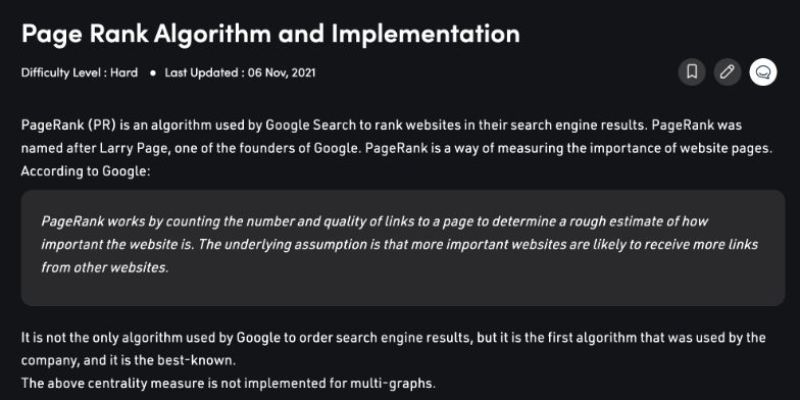
Now, it’s not just the number of links but also the quality of the links that is important. Quality, relevance and authority are what counts when it comes to link building. Spammy link building techniques may work for some businesses, but they should never form part of a strategy for organisations who want long-term organic search success.
How To Build Links
Add links
If you’re able to manually add a link on a site that doesn’t belong to you, that’s referred to as ‘adding a link’. This might be creating social media profiles, commenting on a blog, posting to a forum or adding a submission to a business directory. Building this type of link is easy to do and so for this reason, they tend to have lower value in the eyes of Google. But they shouldn’t be ignored entirely.
Ask for links
As the name suggests, this tactic involves reaching out to the owner of a website and providing them with a compelling reason to link to your site. With this form of link building, you need to provide an incentive – what’s the benefit of the site choosing to link to you over someone else? There are several ways to approach this. Maybe you can create useful content for them with a guest blog, perhaps you can mention them in your own content in a positive way to encourage them to do the same in return, or maybe you can negotiate a link exchange with the site owner.
Earn links
Earning links refers to when other people link to pages on your site without you needing to ask them to do so. Naturally, this requires you to offer incredible content in order for them to want to genuinely link to your site. But people can’t link to your site if they don’t know you have great content, so you need to invest in the promotion of your content in order for people to find it and like it. Earning links is the most effective way of building your link profile but it’s also harder if you don’t have the expertise to do it correctly.
Buy links
While it’s not recommended that you buy links, it is a tactic that some people in the SEO industry still use. But it’s a method that can get your website penalised and is likely to have zero impact on your rankings at best, so we highly recommend you avoid it at all costs!
Link Building In Your Niche
Building links in difficult niches can be hard – it requires in-depth knowledge and research, and understanding of the audience and their goals and motivations, as well as careful content curation. When you’re link building in a unique niche, you need to adhere to strict guidelines for the best results. That’s why it pays to work with experts. Sometimes it’s worth outsourcing link building or white labeling.
Business & Finance Link Building

Link building in the business and finance sector is essential, but highly competitive. In 2021, there were 5.9 million private sector businesses in the UK alone, 98,000 of which were in the finance and insurance industries. With big businesses in this sector taking a large proportion of the market, link building is so important to help smaller companies compete. You need to know your audience well, and to understand what it is they’re searching for and the answers they need, but you also need to know your competitors and the legal jargon that comes with this industry. With so many factors to consider, working with specialists who understand the nuances of this sector is critical.
Casino Link Building

Link building in the casino industry can be challenging, but it can also be highly effective if you do it right. From online casinos and sportsbooks to online poker and bingo, it’s a unique industry that requires careful consideration and research. Google views backlinks as another site ‘vouching’ for the quality and authenticity of your site. But in an industry that can be quickly viewed as ‘scammy’, this is even harder than usual. Not only do you want to keep your site as high quality as possible, but you want to ensure it is perceived as such by Google, and links are one of the best ways to build trustworthiness and credibility.
CBD Link Building

CBD has grown in popularity in recent years, and there are more businesses in the industry than ever before. That makes getting authoritative links harder too. You need to build an effective link building strategy in order to beat the competition, while also appealing to your target market, which can be a challenge. When it comes to getting your brand recognised by the right customers, link building for CBD brands is incredibly effective. As such a popular product, there’s guaranteed to be a lot of competition between brands in the digital landscape but getting the right links can help you stand out from the crowd.
Health & Fitness Link Building

The health and fitness industry is one of the largest in the world, but also one of the most competitive. One of the challenges that many business owners in these sectors face is attracting customers and clients, and encouraging them to sign up for memberships. SEO and link building can help to improve brand awareness and generate relevant traffic, which in turn can help you to achieve your business goals. From personal trainers and yoga teachers to nutritionists and gyms, businesses in this industry can benefit enormously from targeted link building to build a more profitable, credible company.
Sports Betting Link Building

The web is inundated with sports betting websites from all over the globe, making it tougher than ever for businesses to build visibility and reach their intended audience – especially for new businesses coming into the industry. Dedicated sports betting link building techniques are vital to boosting organic traffic and increasing online visibility in a billion-pound industry. Tried and trusted sites are essential in this sector in order to build authority and credibility, but with so many regulations around betting and gambling, getting links can be tough. It pays to work with industry specialists who have a network of contacts to make this process easier, to help you develop an effective link building strategy sooner.
Travel & Leisure Link Building

You may think that link building in the travel and tourism sectors would be easy – it’s an industry rich with engaging content that should make for easy links, right? Well the opposite is true. While the industry is great for building informative, appealing content, it’s also highly competitive and cut-throat. It may be easy to get links, but getting good links from authoritative sites is much harder. You want to avoid the same tactics that your competitors are using and go for higher quality links that will have a stronger impact and lasting power for your site. With fine-tuned processes and creative approaches, it’s perfectly possible to get great links for travel and leisure businesses.
How To Tell If A Link Will Be Valuable
There are several factors that go into whether a link is good or bad. While no-one knows for sure what Google looks for, there are a few concepts that are generally considered to be important. These are as follows:
Authority
Authority can refer to a specific page or an entire website. A link from a high ranking page is deemed more valuable in the eyes of Google than a newly-published page that doesn’t have any backlinks. Similarly, website authority is important – a link from the BBC or the New York Times, for example, will be considered more valuable than a site no-one has heard of.
However, neglecting links from low-authority websites entirely is a mistake. Just as a newly published page can acquire plenty of backlinks over time, a low-authority website can also become a huge deal in time. So using domain ratings and other metrics is important to gauge which sites provide the best opportunities.
Relevance
A link from a site in a similar industry or focusing on the same topic is more applicable than a link from an unrelated site. If you have a blog about clothes, for example, and two sites link to it – one about clothes and another about finance – the clothing site will have a stronger effect on your rankings, because it’s related.
You should strive to get links from sites that are relevant to your own, rather than just taking any link opportunity that arises. When it comes to links and relevancy, fewer, more curated links are more powerful than more links with little to no relevance.
Anchor text
Anchor text is the clickable text that contains the link to another page. It usually refers to whatever the link is about, and it’s something that Google takes into account. The keywords should be relevant to the page being linked to, but above all they should be natural – you shouldn’t be shoe-horning keywords in because there’s a high chance that it will have a negative effect on your rankings.
The more you try to control how a page links to you, the higher the chances are that Google will penalise you for it. White-hat link building techniques result in little to no control over anchor text, so keep it natural for the best results.
Nofollow and follow
“Nofollow” is a link attribute that tells search engines that the link page doesn’t want to give its vote to the page being referenced. Google never used to count votes from nofollow links, but since 2019, it now includes some nofollow links in its ranking algorithm. Businesses should be building followed links where possible, because these are supposed to be counted, but a nofollow link from a high authority, relevant page shouldn’t be avoided. Consider the impact of a site like Wikipedia – all outgoing links on this site are nofollow links, but since getting a link from Wikipedia is very difficult, many SEOs are convinced that Google considers these links to be more valuable. When it comes to follow and nofollow, you should assess each link on its own basis.
Placement
The placement of a link is one of a few things that can transfer authority through click through rate. Links within content will be more likely to get clicks than links in the sidebar or footer, since this garners more attention from visitors, but how high the link is on the page also counts. Readers are more likely to read the start of the content than the end, so a higher-placed link has more value.
Destination
There are three destinations where you can point a reader – the homepage, linkable assets, or the pages you need to rank highly. The latter tend to be some of the hardest to rank well, since people prefer to link to informational pages to provide free value to their audience, rather than commercial pages that require conversions.
A challenge that any SEO faces is knowing how to link to those more ‘boring’ pages – and while there’s no single answer, one of the most effective ways to do this is to utilise internal linking to improve the ranking of these types of pages. You should be building as many links as you can to linkable assets to funnel that linking power towards the pages you want to rank for, via internal linking.
What Are Black Hat Links?
“Black Hat” SEO practices are disreputable and outdated techniques that go against search engine guidelines. It’s no secret that SEO techniques take time to implement, which leads some businesses to try and ‘game’ the system by using tactics such as keyword stuffing, paid links, stolen content taken from other sites, or spamming blog comments. But it’s important to avoid black hat SEO techniques, because they’re not only a waste of time and money but they’ll also backfire and can leave your site penalised by Google. While Black Hat links aren’t illegal, they are definitely frowned upon by search engines.
Popular Link Building Tools
Tools For Keyword Research
High quality keyword research uncovers the terms and phrases that people are searching for – they’re the questions and answers your users are seeking, so as a business, you need to be supplying content that relates to these terms. Keywords should support your business goals, whether that’s increasing page views and traffic, capturing leads or selling products and services.
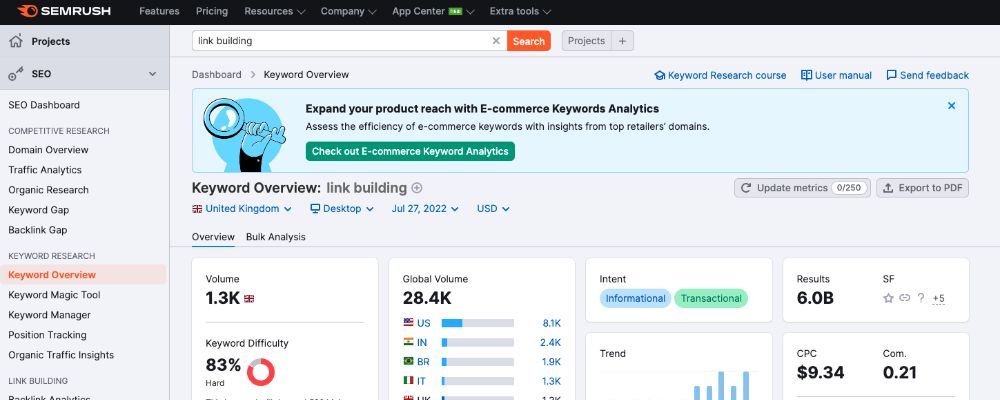
Semrush is the primary tool for keyword research, uncovering keyword themes and trends so you can build content that’s targeted towards these topics.
Tools For Backlink Research
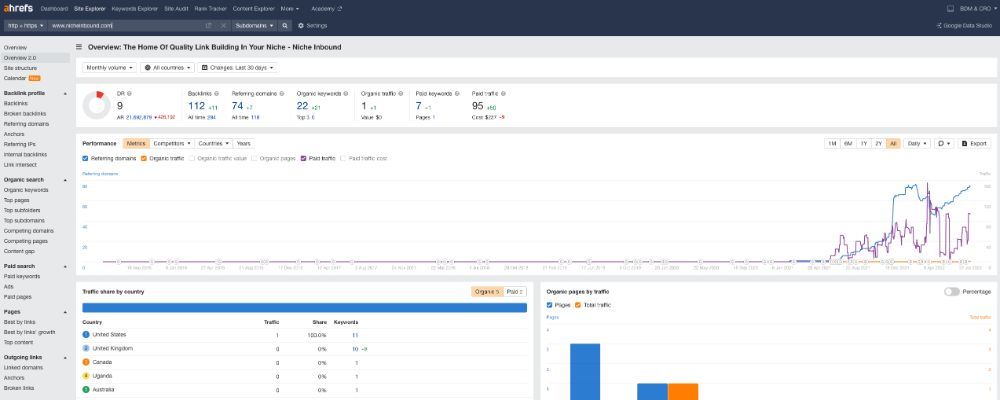
Staying on top of your competitors is essential in this industry, and plays a key role in developing a strong link building strategy. Ahrefs Site Explorer tool is helpful for researching backlinks – simply plug in a site or URL and you’ll get a huge list of backlinks pointing to it, along with metrics and filters so you can find the right opportunities. Semrush provides Backlink Analytics so you can study your own and your competitor’s backlink profiles, with quick comparison features, referring domains and IPs, anchor text analysis and more.
Tools For Content Research
Content research tools make the process of creating informative, engaging and link-worthy content easier, and you can use them to find unique angles on a topic that’s generated a lot of likes and shares, or come up with topics around your industry that you may not have considered or haven’t covered on your site. Ahrefs Content Explorer is a highly popular tool for this, indexing billions of pages to help you narrow down your search for noteworthy content.
Semrush is another effective tool for this – their Topic Research feature enables you to follow trends and find the popular conversations to streamline your search for blog ideas.
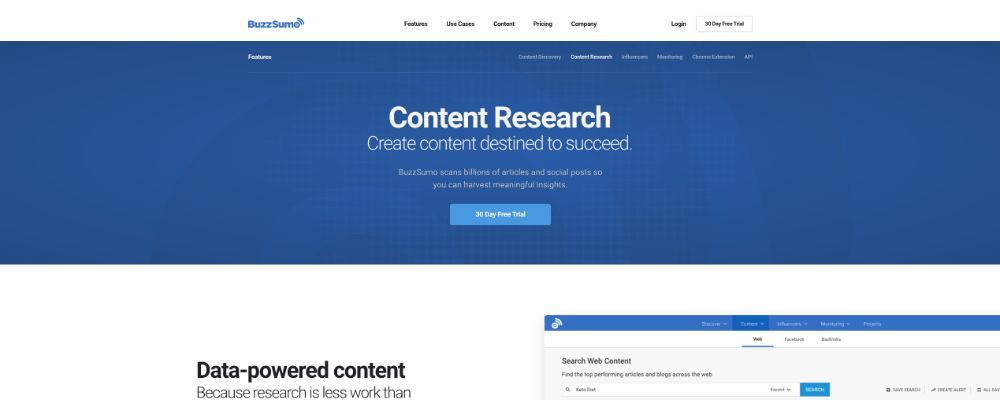
And Buzzsumo can also be used for content research. With an archive of over 8 billion articles, it’s a great resource for finding content titles and topic ideas for your own site, regardless of industry.
Tools For Email Outreach
The majority of marketers still use email marketing to distribute content, and with over 3.7 billion people using emails around the world, it’s no surprise. But as a business, using tools to make the process of email distribution easier and more effective is essential.
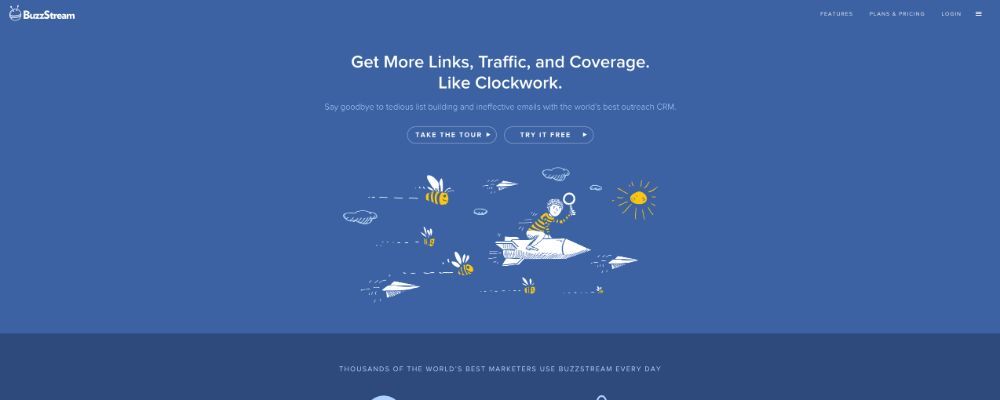
Buzzstream is one of the most effective end-to-end solutions for email outreach, as it integrates with SEO tools such as Moz and Ahrefs and has advanced features such as data research and campaign trackers so you can see how an email campaign is performing.
Tools For Monitoring Progress
With any SEO strategy, you need to keep on top of how things are performing to know where to make improvements and iterate on your success. Analytics tools help you to keep an eye on traffic, trends and site statistics, so you can see where pages are performing well and where changes need to be made.
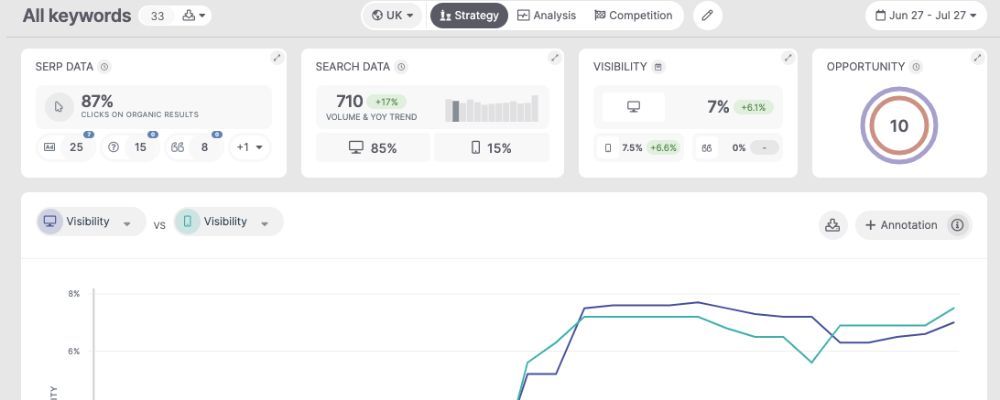
SEOmonitor is an all-in-one platform that provides data and clear dashboards so you can monitor the progress of your site, from keyword-level metrics and search volumes to forecasting and organic traffic levels.
I Don’t Have Time For Link Building!
There’s no denying that developing a link building strategy takes time and research. As a business owner, you may be wondering how you’ll fit it all in alongside your day job. For the best results, it’s worth outsourcing link building to a team that can focus exclusively on this side of your business, leaving you free to work on other areas of your company.
Our SEO experts have developed tried and tested link building methods based on extensive experimentation over the years, and they’ve honed the process of sourcing the right keyword data and building strong relationships with webmasters for excellent results. With expertise in various industries, and a wealth of SEO knowledge, we’re able to deliver great results for your business so you can focus on what you do best.
Conclusion
As you’ll have no doubt realised in reading this guide, there’s a lot that goes into a link building strategy, from choosing the right keywords and creating content to getting your links from the right places. But the effort is certainly rewarded when you get the balance right – link building can help to build authority and trust, boost online visibility and increase conversions.
At Niche Inbound, we’re specialists in this field and we can help you build an effective link building strategy that’s tailored around your industry and your business goals – get in touch with us today to learn more.

